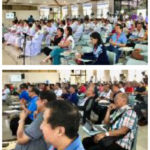Cubao Diocese Clergy
 The Roman Catholic Diocese of Cubao called for a Plenary Diocesan Assembly last February 20-21, 2018 in Tagaytay and invited all the Cubao clergy, Parish Lay Coordinators, and parish Formation Ministry heads, plus ofQice staff and professional facilitators, for an overnight planning session to formulate the eightpoint priority agenda of the diocese for the next seven years, 2018-2025. The planning was expected to focus on – BECs; formation; clergy; structures and policies; social action; media; stewardship; and catechetics.
The Roman Catholic Diocese of Cubao called for a Plenary Diocesan Assembly last February 20-21, 2018 in Tagaytay and invited all the Cubao clergy, Parish Lay Coordinators, and parish Formation Ministry heads, plus ofQice staff and professional facilitators, for an overnight planning session to formulate the eightpoint priority agenda of the diocese for the next seven years, 2018-2025. The planning was expected to focus on – BECs; formation; clergy; structures and policies; social action; media; stewardship; and catechetics.
 In all, there were 163 participants who stayed on for the two half-day planning sessions. Bert Santos attended as CTK Lay Coordinator while David and Fely Ong attended as CTK Formation Ministry heads.
In all, there were 163 participants who stayed on for the two half-day planning sessions. Bert Santos attended as CTK Lay Coordinator while David and Fely Ong attended as CTK Formation Ministry heads.
The outcome of the Diocesan Assembly was an eight-point priority agenda, or roadmap, for 2018-2025.
2018-2025 Agenda for Cubao Diocese
1. Forming Families of Faith and Mission
2. Animating Parish Life, Ministry and Communion
3. Ensuring Faith Integration and Renewal
4. Upholding Human Dignity and Integrity of Creation
5. Engaging the Youth
6. Molding Shepherds after the Heart of Jesus
7. Promoting New Evangelization and Media
8. Embracing Stewardship as a Way of Life
P1. Forming Families Of Faith And Mission. Parishes will be agents to strengthen and support marriages and families facing the realities of present issues.
P2. Animating Parish Life, Ministry And Communion
a. Parishioners experience sense of ecclesial communion, i.e., belongingness. Resolve issues on un-churched, inclusion, mall culture, parish boundaries, gated communities.
b. Parishioners foster a sense of mission. Resolve issues in lack of members, volunteers, aging members, recruitment.
c. Parishioners are imbued with Spirituality of Stewardship and Spirituality of the Church of the Poor. Address inadequate formation of parishioners, attitude problems
P3: Ensuring Faith Integration And Renewal
a. Institutionalization of Pastoral Development.
b. Well-informed, formed and transformed parishes.
c. Formation for the unchurched, nominal Catholics, millennials and other interest and cultural groups.
d. Synergy of faith-formation programs.
P4: Upholding Dignity and Integrity of Creation (Social Issues, Livelihood, Environment- Ecology, Justice And Peace And Integrity of Creation)
a. To create programs that would facilitate inclusion and bridge the gap with the parish and urban poor in the diocese.
b. To strengthen and implement programs of the social service ministry.
c. To create programs that would enhance the delivery of basics services by the local government.
d. To create educational opportunities that would include the poor.
e. To create programs for active participation and empowerment of lay leaders and laity on temporal affairs, specifically justice and peace.
f. To create programs that would heighten care for Mother Earth
P5: Engaging The Youth
a. Empowered youth who are Christ-centered servant leaders and active proponents of change through responsive programs (e.g. BEC) and activities that will care, support and journey with the youth.
b. The youth manifest responsible participation in the life-mission and work of the catholic faith community.
c. The young people be properly-informed and formed about the catholic faith and christian values.
P6: Molding Shepherds After The Heart Of Jesus
a. Increase in number and growth in holiness of seminarians mirroring the life of the Good Shepherd for future ministry and service to the diocese.
b. Priests who are integrated, holistic, and formed through Gospel values towards joyful holiness.
c. Priests who are secured about the future and are assured of care and concern for their retirement.
 P7: Media And New Evangelization
P7: Media And New Evangelization
a. Dynamic two-way communication is established between the diocese and the parishes, and with the parish pastoral council and the parishioners, where parishioners are properly-informed of parish programs and activities; and the PPC is given feedback in order to arrive at sound decisions. (Effective communication, data gathering, content generation, information dissemination, where parishioners will be informed on how the Word of God will be lived)
b. Maximization of the use of traditional and modern means of communication: newsletter, parish theatre groups, parish bulletin boards, digital/LED screens, mobile apps/devices, Internet and social media (FB, Twitter, Youtube, Instagram, etc.)
c. Production and dissemination of creative media from the Diocese level to the parish level and vice-versa: music, films, animation, telenovelas always have lessons that deal with every day concerns (ex., Christmas special, Lenten special, etc.)
d. Promotion of media information and literacy
e. Enable, empower and train Diocesan and Parish Media Ministries through skills training, seminars and workshops on media information and literacy
f. Equip and provide parish media ministries with the necessary tools and equipment for their media productions
g. Involve the youth in the planning and information dissemination
h. Synchronization of media programs grounded in the parish level: Institutionalize programs from the Diocesan level to the parish level and synchronize media activities, especially involving parishes
P8: Embracing Stewardship As A Way Of Life
a. To make all parishes in the diocese of Cubao “stewardship parishes”: where parishioners live out the spirituality of stewardship, recognizing the graciousness and generosity of god calling us to be “good and faithful servants” (Matthew 25:21), acknowledging the gij we have received and sharing them gratefully and generously.
b. To create a program of formation in the spirituality of to deepen the pastors’ and the parishioners’ understanding and love for god and his church and to develop ones’ gratitude in receiving and generosity and giving.
c. To create a program of parish involvement to systematize parishioners’ participation in the parish life and activities: a`ending worship, sharing their expertise in the community and supporting the mission and apostolate of the church.
d. To review the CBCP pastoral letter on stewardship and study the possible ways of implementing appropriate and effective guidelines suited to the context of the Diocese of Cubao.
